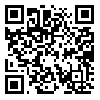BibTeX | RIS | EndNote | Medlars | ProCite | Reference Manager | RefWorks
Send citation to:
URL: http://jpcp.uswr.ac.ir/article-1-479-en.html
2- Department of Psychology, Faculty of Humanities, University of Kashan, Kashan, Iran.
Objective: The purpose of the present study was to investigate the relation of coping styles and attachment styles with social anxiety among high-school students.
Methods: The present study was correlational research. Study population comprised all male and female students of Kashan high schools. A total of 440 students (196 males and 244 females, aged from 17 to 18 years in the third or fourth grade of Kashan high schools (academic year 2015- 2016) were selected by cluster sampling method. Data were gathered using social phobia inventory, coping inventory for stressful situation, and adult attachment inventory. For analyzing the data, analysis of regression method were used.
Results: There were significant correlations between the social anxiety problem-focused coping style (r=-0.16, P<0.05), emotion-focused coping style (r=0.40, P<0.01), and avoidance coping style (r=0.03, N.S). Moreover, results indicated correlations between social anxiety with secure attachment style (r=-0.10, P<0.05), avoidant attachment style (r=0.23, P<0.01) and ambivalent attachment style (r=0.26, P<0.01), too. Coping styles (emotion-focused and problem-focused styles) predicted 19% variation of social anxiety and attachment styles, 11% variation of social anxiety.
Conclusion: Results of this study support the role of coping styles and attachment styles in social anxiety and show that maladaptive coping strategies predispose people to social anxiety. Also,insecure-ambivalent attachment people are vulnerable to social anxiety.
Received: 2016/10/8 | Accepted: 2017/01/15 | Published: 2017/04/1
| Rights and permissions | |
 |
This work is licensed under a Creative Commons Attribution-NonCommercial 4.0 International License. |







